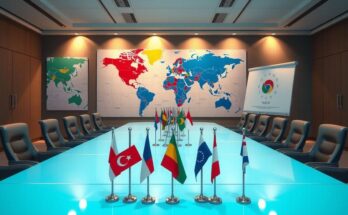President Luis Arce of Bolivia has announced measures to tackle a fuel shortage, including cutting government lunch breaks, reducing in-person schooling, and halving state vehicle usage. These initiatives aim to stabilize the economy amid ongoing protests and rising inflation, while prioritizing the agricultural sector for fuel distribution.
In response to an ongoing fuel shortage, President Luis Arce of Bolivia announced significant measures, including eliminating lunch breaks for government employees, reducing in-person schooling, and cutting the usage of state vehicles by fifty percent. This initiative aims to alleviate the economic hardships resulting from a crisis that has prompted public protests across the country.
Bolivia has struggled economically since 2023, primarily due to a decrease in gas sales, which historically constituted the nation’s main source of foreign revenue. As the country reduces its fuel imports, the lack of available resources has led to severe inflation and a notable fiscal deficit. In a televised address, President Arce emphasized that the nation remains capable of generating public investments despite the pressing circumstances.
The new measures also include promoting virtual classes, which will reduce reliance on public transportation and minimize traffic congestion during peak hours. Furthermore, fuel distribution will prioritize the agricultural sector, and military personnel will intensify efforts to combat fuel smuggling. Reports indicate inflation in Bolivia has reached a sixteen-year high, compounding the economic crunch citizens face.
President Arce characterized the current situation as a challenge of liquidity related to U.S. dollars. Questions remain regarding whether he will pursue reelection in August, amid uncertainty surrounding the political landscape, including the potential return of former leader Evo Morales who faces legal charges.
In summary, Bolivia is implementing drastic measures in an effort to address a significant fuel shortage and its economic repercussions. By reducing work hours, limiting state vehicle use, and prioritizing certain sectors for fuel distribution, the government aims to stabilize the nation’s economy. The ongoing fiscal challenges and rising inflation further complicate the situation, highlighting the need for effective management of resources during this crisis.
Original Source: business.inquirer.net




